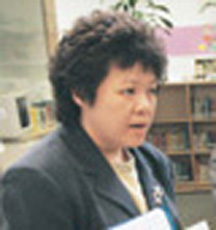|
By Leanne Miller
 "Some
days, I canít even get to the washroom." Itís only 7:30 a.m., but
Donna Quanís day began three hours ago. This is her fourth year as a
principal. For the past two sheís been at Rockford Public School in
Toronto. Her day routinely begins at 4:30 with e-mail and walking the dog. "Some
days, I canít even get to the washroom." Itís only 7:30 a.m., but
Donna Quanís day began three hours ago. This is her fourth year as a
principal. For the past two sheís been at Rockford Public School in
Toronto. Her day routinely begins at 4:30 with e-mail and walking the dog.
Quan says, "The board conducts business online. This is the best time
of day for me to be productive because there are no interruptions."
Rockford is a Kó6 school with 850 students, 40 teachers and two
vice-principals. Quan describes it: "Itís a busy place and the
demographics give us a fascinating mix. Most students are Russian Jews and
many are new to Canada. We also have a large Korean population. Sixty-seven
percent of our students need ESL support. With so many students and such a
high ESL population, weíre seen as a needy school. In reality, weíre one
of the best. The kids want to learn, we have few serious discipline problems
and parents are supportive. Itís a wonderful place to work and there
isnít a day that I donít learn something new that reminds me how
much I love this job."
In theory, the principalís job is to run the ship: to ensure that the
plant runs smoothly and that students are taught solid curriculum by good
teachers. It even seems easy compared to dealing with 30 needy and energetic
kids in a confined space for six hours every day.
Quanís day consists of endless interruptions. When asked which parts are
work and which interruptions, she smiles wryly, "Thereís no
distinction. Everything is my job and I have to make fast and important
decisions all day long." Her rest time comes when she walks around the
schoolyard in the morning and after school and when she visits classrooms.
Her lunch remains untouched and she sips cold coffee. "Iíve acquired
a taste for it."
She defines her job: "Safety is number one. Next is ensuring that
strong program is delivered, with a focus on literacy for our population.
Providing strong community leadership and involvement is important and
finally, making every teacher a star. The focus of each of these four
elements is the students. Whenever I have to make a decision, I ask myself
whatís best for student learning; itís always about the kids."
Before she enters the school, Quan quickly tours the yard, looking for the
previous nightís garbage, broken glass and the occasional needle. She then
finds the caretaker and asks him to clean up the litter. "This is my
castle and I look after it well."
Quan has more encounters before she unlocks her office door. A maintenance
man is in to replace a window and she wants the area blocked off so the
children wonít be in harmís way. Sheís hosting a meeting of
administrators from her family of schools in the library that morning and
she helps set up chairs and refreshments. As she moves chairs with her
secretary, Quan comments, "These cost $3 more than they did in June.
Thatís $900 in chairs, thatís a lot of money. We need a better
deal."
Next comes her morning walk with one of her vice-principals. They take
walkie-talkies and scour the halls and the schoolyard. They greet students
and parents as they arrive and soon notice that a basketball hoop is
dangling ó another safety issue to be fixed immediately.
Quanís morning is supposed to be devoted to the upcoming meeting. She
starts making notes on what sheís going to present, but has no more than a
minute before her next interruption, and she never gets back to it.
The meeting unfolds slowly. Presentations are given about the boardís new
phone system and about new processes to deal with special needs children. To
an outsider, this seems to be frustrating: a busy school day is unfolding
and Quan is stuck in a meeting. She is, however, completely focussed on the
task, making notes and participating actively.
At break, her colleagues chat, but Quan, walkie-talkie in hand, patrols her
castle. She wants to know whatís happening. She visits several classes to
see what students are learning.
The meeting resumes and soon itís time for Quan to present. She is on a
board committee to co-ordinate implementation of National Quality
Initiative, a school improvement initiative. Her comments reflect her strong
belief that everything must be done to benefit student learning. She
emphasizes that this is not just another bandwagon. She anticipates her
colleaguesí reactions ("yet another time-consuming, mandated
task") and talks about how it complements work administrators are
already doing. She says, "This is congruent with what youíve been
doing; it supports the effective schools research and it reflects the
Collegeís standards of practice. Itís worthwhile because it will benefit
your staff and students."
Quanís presentation was well-prepared and well-received. One colleague
comments, "That 10-minute presentation was the best part of the
meeting. It was informative, tight and enthusiastic."
Thanks to the meeting, Quan now has an urgent task. Her superintendent needs
precise attendance numbers to make final staffing decisions. Rockford is up
33 students and Quan wants a new teacher. Enrolment data must be compiled
and assessed, several documents must be completed and a compelling rationale
must be written. The submission deadline passes and Quan continues working.
She calls her superintendent to relay the information and the documents go
electronically, 30 minutes past deadline.
Next comes a meeting with an upset parent. The subject matter is delicate,
involving racist attitudes, two teachers and a boy who has just arrived from
Russia. He hardly speaks English and his mother translates. In the end,
whatís best for the child wins and the parentís unreasonable request is
refused, politely, thoughtfully and firmly.
Quan will not be swayed to do something that does not benefit the student or
her staff. Near the meetingís end, she asks the student to leave and she
takes a different approach. "Iím a mom too and I faced a similar
problem once." Itís this personal approach, showing that she
understands the situation as a parent, that finally convinces the mother.
Quan concludes the meeting by saying, "Be supportive of this decision.
Stop showing him that you are apprehensive. He needs to see that you are on
side and before you know it, he will be too."
The phone rings as Quan sips cold coffee. Itís a vice-principal from
another school who is preparing for the promotion process. Theyíre going
to review her readiness statement for her upcoming interview. Quan offers
thoughtful and constructive criticism: "Use the referee comments as
your rubric and make sure you give them what they are looking for. For
exampleÖ" She also praises the strong elements of the document.
Quan is mentoring 11 colleagues and she takes it seriously. "I
wouldnít be an administrator today if someone hadnít encouraged me to
move forward. I was happy in the classroom, but now I see other ways to help
students. I want to encourage others to do the same."
This leads to a discussion of one of her most important roles: mentoring her
staff. "Every teacher is a star and itís my job to do what I can to
help them shine," she says. "It may be advocating for more
resources or extra staff, it may be watching them teach and praising what
theyíre doing. Itís not about stickers with adults; itís about giving
them opportunities for self-improvement and self-reflection. I need to
remind them about accountability, support them when theyíre disappointed
and give them opportunities to grow."
Quan is not afraid to offer constructive criticism. During her walks about
the school, she notices two problems with teachers. Later, she puts notes in
their mailboxes asking them to see her the next day. "Safety violations
and behaviours that donít meet the standards of practice will not be
ignored."
Rockford, like many schools, believes in the value of partnering with a
faculty of education. Today there is a meeting of their OISE partner and
several teachers and administrators from neighbouring schools who will host
student teachers this year. Quan visits the meeting, staying long enough to
get a sense of what will happen this year and to support her teachers who
are involved.
Itís nearly 6:00 p.m. when she enters a serious talk with a teacher about
the effects of the September 11th attacks, discussing what approach the
school should take. Quan points out that board specialists have offered to
come and counsel students. She brings up the same topic with another teacher
an hour later and they discuss the benefits of individual versus a
school-wide response. She decides to get input from her whole staff, and
adds this item to her agenda for the upcoming staff meeting.
Itís now 7:00 and Quan sits with her two vice-principals to discuss the
day. The talk covers tomorrowís community walk, individual students and
teachers, what happened at the administratorsí meeting, school staffing
and the myriad of after-school activities going on at Rockford.
When asked about balancing her long working day with her family, she
replies, "Sure I work long hours, but I never lose sight of my family.
I spoke to my daughters and my husband today and I strongly encourage my
staff to strike a balance between family and school." Quanís balance
started early this morning as she set the breakfast table with homemade
muffins. She usually sees her family for a few minutes at 7 a.m. before she
leaves.
Donna Quan gets home at 8:30. She finally reads her mail and prepares for
tomorrow. Her working day ends some 16 hours after it began.
Donna Quan
Rockford Public School
Toronto District School Board
Principal
Certified in 1983
Ontario Institute for Studies in Education of the University of Toronto
first
page
previous
page
next
page
|
![]()
